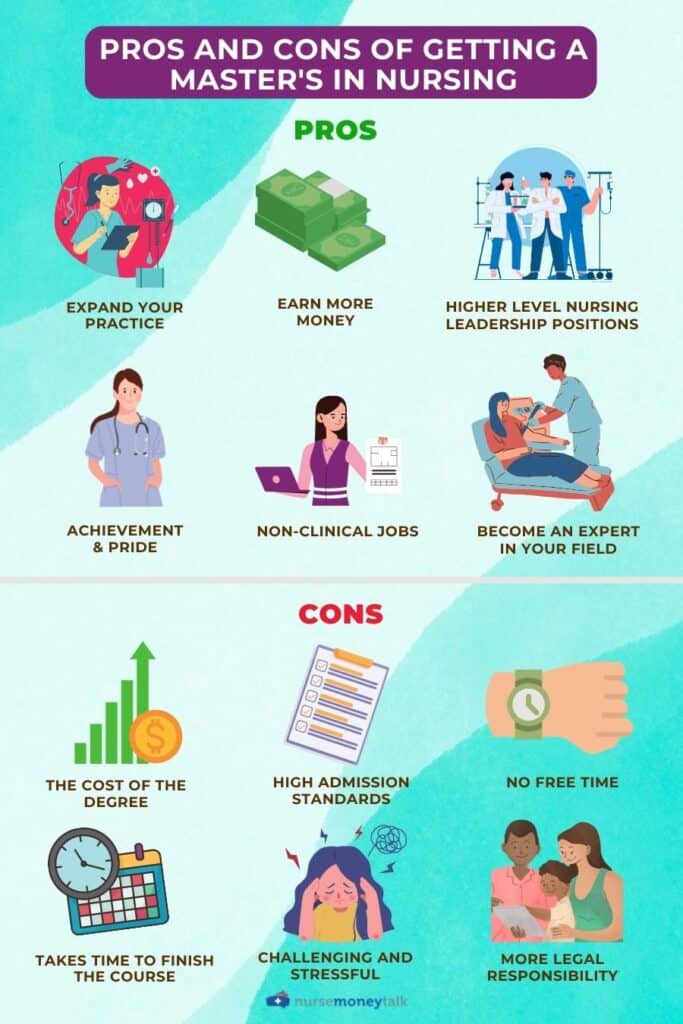Have you been considering applying for a master’s in nursing degree (MSN)?
It’s an important decision requiring time, money, and perhaps even sanity (just kidding). But the rewards are worth it!
So to help make up your mind about whether or not getting this additional education would benefit YOU personally, I have compiled some pros & cons below.
Why You Should Get Your Master’s Degree
Extending your qualifications has many positive effects on your career. As a master’s degree holder, you will be able to take on more responsibility in your work, mentor other nurses, and become a vital part of your healthcare facility. Here are some examples of how a master’s degree can improve your working life.
Pros of Getting Your Master’s in Nursing
1. You Get to Expand Your Practice

Completing a master’s degree will make you an advanced practice nurse with expert knowledge in your chosen field.
That advanced knowledge will help you provide better care for your current patients and give you more responsibility in your unit.
2. MSN Can Help You Earn More Money

Making more money is one of the most cited reasons nurses upskill their BSN degree to an MSN degree.
As an MSN holder, you can also enter higher-level positions which bring a higher salary.
Whether you gain a master’s degree in nursing education, nursing leadership, or administration and informatics, it can secure a senior-level position in your healthcare facility. Senior positions bring in higher salaries.
On average, a nurse with a master’s degree earns $20,000 more than a BSN-qualified nurse. So, even if the tuition for this additional degree is not cheap, you can recoup your costs over a year or two after graduating.
3. MSN Is A Prerequisite For Higher Level Nursing Leadership Positions

Suppose you’re thinking about becoming a nurse leader.
In that case, an MSN degree can help you forge a career path focusing on leadership, team management, and systems development to improve patient care at your health facility.
Graduating from an MSN program will help you secure a leadership role because you will be seen as a practitioner with a depth of knowledge and dedication to your field.
You can choose to go after a job title like a clinical nurse leader, patient care director, or chief nursing officer.
In those positions, you will be responsible for providing evidence-based practice to ensure that your patients receive high-quality nursing services that are efficient and within established budgets.
4. Sense of Achievement and Pride

It takes a lot of hard work, dedication, and perseverance to graduate from any of the available MSN programs.
Once you graduate, you will appreciate the effort you put into completing this advanced degree.
5. Using Your Nursing Degree For A Non-Clinical Job
If you want to leave the clinical field to pursue other career paths open to nurses, having an MSN degree will help you land those opportunities.
You may want to become a nurse educator or get a job in administration where you will lead the overall nursing operations.
Not to mention, the MSN degree will make you qualified for a position in public health where you can oversee public policy on national health or even get a job with the World Health Organization.
5. Become An Expert In Your Field

If there is a specialty in nursing that interests you and you are passionate about it, consider acquiring an advanced skill set in that discipline.
MSN programs allow students to go more in-depth within a specialty and become experts in their field.
For instance, you may want to work exclusively with cardiac patients or become a neonatal or forensic nurse.
Irrespective of your career goals, there is no doubt that a master’s degree offers great benefits for your development as a nurse and as a valued healthcare employee.
However, without looking at the other side of the coin and exploring the negative side of getting an additional nursing degree, you will be unable to make a fully informed decision about whether pursuing an MSN degree is right for you or not.
So, here are some of the negative aspects of getting a master’s nursing degree.
Reasons Why a Master’s In Nursing Degree Is Not For You
Not everyone needs a master’s degree to have a fulfilling career.
Even though some of the benefits described above are tempting enough to convince you to get that application process going, studying further may not be the right thing for you.
Here is a list of the negative aspects of getting a master’s degree to help you balance the good and bad.
1. Costs Of Advanced Degree

Getting an MSN degree is expensive. The US News reports said an online master’s degree costs between $35,000 and $60,000.
Some employers will help you fund tuition in return for promising to work for them for several years after you graduate. However, if you do not have that option, you will have to find the money to fund your studies.
That may be difficult if you already carry a home bond, car payments, and school fees for your little ones on your nursing salary.
2. High Admission Standards
The MSN degree is not necessary to practice nursing and signifies a higher body of knowledge and associated prestige.
It stands to reason that not everyone can or will be accepted into the program. Most programs require a GPA of 3.0 even to be considered for a spot.
Such a high GPA score has been shown to indicate a student’s potential performance in the program.
Therefore, if your GPA is lower, you may be required to take prerequisite courses to convince the academic institution that you can cope academically with the work.
3. No Free Time

Having a work-life balance can be difficult at the best of times. Especially if you already have a family with all its commitments and needs.
Taking the advanced nursing knowledge course may not be the best if you have recently become a new mom or have a plate full of family commitments.
MSN programs are rigorous and demand a lot of attention to completing the coursework and assignments.
Even if you are enrolled in an online program, be prepared to spend a significant number of hours studying the material. The study time will greatly reduce your available free time.
4. It Takes Time To Finish The Course

Depending on the type of MSN program you choose to study, you can expect to spend between two to four years completing all the requirements.
That is a great chunk of time you will need to invest before you can cross the stage at graduation.
The actual length of time will also depend on whether you are studying full-time or part-time. Some students complain that the master’s program seems never-ending.
5. MSN Programs Are Challenging And Stressful

MSN programs are designed to build on and broaden your BSN knowledge.
It stands to reason that the curriculum is far more challenging than the one in the BSN degree.
Of course, hundreds of students graduating each year can attest that getting through the work is possible and rewarding, but if you were one of those students who barely scraped through the BSN degree, perhaps an MSN degree may not be for you.
6. MSN Graduates Have More Legal Responsibility
As a nurse, you have a legal obligation and responsibility to your patients. It means a patient can sue you if they feel your actions have caused them any loss or injury.
As an MSN graduate, you will practice at a higher level, meaning your legal responsibility will also increase.
You will need to ensure that your nursing care is done according to the best standards of care, safety, and competence, especially if you practice as a nurse practitioner in private practice.
Key Takeaways

Getting the MSN degree is satisfying and beneficial if you aspire to nurse leadership, education, or work as a nurse specialist.
However, if you love your job as a bedside nurse, no law says you have to have an MSN degree.
You may want to stick with your BSN degree and don’t want to study further. It is your decision. Sometimes, just being good enough is better than trying to be something you are not.
